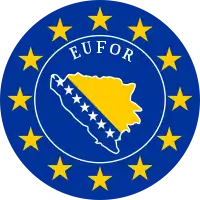Operation Althea
Operation Althea, formally the European Union Force Bosnia and Herzegovina (EUFOR), is a military deployment in Bosnia and Herzegovina to oversee the military implementation of the Dayton Agreement.[1] It is the successor to NATO's SFOR and IFOR. The transition from SFOR to EUFOR was largely a change of name and commanders: 80% of the troops remained in place.[2] It replaced SFOR on 2 December 2004.
| European Union Force Bosnia and Herzegovina | |
|---|---|
 New emblem adopted in March 2017 | |
| Military leader | |
| Political leader | |
| Dates of operation | 2 December 2004 – present |
| Allegiance | |
| Motives | Successful implementation of the Dayton Agreement |
| Size | 600 members |
| Battles and wars | the Dayton Agreement |
| Colours | Blue, white, and yellow |
General aspects
Civilian implementation of the Dayton Agreement is enforced by the Office of High Representative. In 2007, EUFOR had 600 troops from 21 countries,[3] mostly from the member states of the European Union (EU). There are however, additional troops from other non-EU member states such as Chile and Turkey.
The EUFOR's commander is currently Major General Reinhard Trischak of Austria, since June 2019 (all of EUFOR's commanders since 2009 have been Austrians). For this mission, the European Union Military Staff is using NATO's Supreme Headquarters Allied Powers Europe (SHAPE) as the EU's Operational Headquarters (OHQ) and is working through the Deputy to the Supreme Allied Commander Europe, a European officer.
The EUFOR assumed all the missions of the SFOR, except for the hunt for individuals indicted by the war crimes tribunal, notably Radovan Karadžić, former leader of Republika Srpska, and Ratko Mladić, their former military leader, which remained a mission for NATO[2] through NATO Headquarters Sarajevo.[4] The EUFOR does have police duties against organised crime, which is believed to be linked to suspected war criminals.[5] It worked with the European Union Police Mission in Bosnia and Herzegovina (EUPM) and with the Bosnian Police. The European Union Special Representative in Bosnia and Herzegovina provides political guidance on military issues with a local political dimension to the EUFOR.
As of March 2019, the total force of EUFOR are at 600 troops from 19 countries, including EU member states and non-EU "Troop Contributing Countries" (TCC) are present within EUFOR (Albania, Austria, Bulgaria, Chile, Czech Republic, France, Greece, Hungary, Ireland, Italy, Poland, Portugal, North Macedonia, Romania, Slovakia, Slovenia, Spain, Switzerland and Turkey).[6]
Commanders
| No. | State | Rank | Name | Tenure |
|---|---|---|---|---|
| 1 | Major general | David Leakey | 2 December 2004 – 6 December 2005 | |
| 2 | Major general | Gian Marco Chiarini | 6 December 2005 – 5 December 2006 | |
| 3 | Rear admiral | Hans-Jochen Witthauer | 5 December 2006 – 4 December 2007 | |
| 4 | Major general | Ignacio Martín Villalaín[7] | 4 December 2007 – 4 December 2008 | |
| 5 | Major general | Stefano Castagnotto | 4 December 2008 – 3 December 2009 | |
| 6 | Major general | Bernhard Bair | 4 December 2009 – 6 December 2011 | |
| 7 | Major general | Robert Brieger | 6 December 2011 – 3 December 2012 | |
| 8 | Major general | Dieter Heidecker | 3 December 2012 – 17 December 2014 | |
| 9 | Major general | Johann Luif | 17 December 2014 – 24 March 2016 | |
| 10 | Major general | Friedrich Schrötter | 24 March 2016 – 28 March 2017 | |
| 11 | Major general | Anton Waldner | 28 March 2017 – 28 March 2018 | |
| 12 | Major general | Martin Dorfer | 28 March 2018 – 26 June 2019 | |
| 13 | Major general | Reinhard Trischak | 26 June 2019 – 14 January 2021 | |
| 14 | Major general | Alexander Platzer | 14 January 2021 – present | |
See also
References
- https://af.reuters.com/article/worldNews/idAFKCN1SK1U6
- "EU troops prepare for Bosnia swap". BBC. 23 October 2004.
- EUFOR Troop Strength (1 November 2007)
- "Archived copy". Archived from the original on 2007-11-23. Retrieved 2007-12-05.CS1 maint: archived copy as title (link)
- Evans, Michael (29 November 2004). "EU force to take on pimps, drug barons and smugglers". The Times. Retrieved 13 January 2007.
- "EUFOR Fact Sheet - Countries of EUFOR". EUFOR. Archived from the original on 2011-07-18. Retrieved 2008-02-01.
- EUFOR change of command ceremony
Further reading
- Le Monde (in French)
- http://eeas.europa.eu/archives/csdp/missions-and-operations/althea-bih/pdf/factsheet_eufor_althea_en.pdf
- Dominik Tolksdorf The Difficulties of the European Union in Supporting the Europeanization of Bosnia and Herzegovina EU Frontier Policy Paper, Budapest: Center for EU Enlargement Studies – Central European University, 2011
External links
| Wikimedia Commons has media related to EUFOR Althea. |